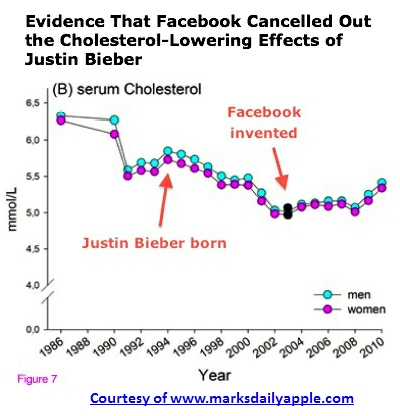There’s a big difference between “causation” and “correlation”. Just because A is around when B happens does not mean A causes B. It could be that A’s friend C is actually the instigator, and A and C happen to hang out together a lot. Or let’s say B is graffiti at the subway. A can only get out of school on Saturdays which is the only day B occurs because that’s when the graffiti school has their practical exercises.
Or, to be a bit more complex, when Justin Bieber was born, cholesterol scores began to decrease. Until, that is, Facebook was invented, which reversed the decrease, thereby proving the Beebs is not as powerful as Facebook!
Did you know that the more mozzarella consumed in the US, the more civil engineering degrees that are awarded?
Did you know that the age of Miss America strongly correlates with the number of murders by steam, hot objects, or hot vapours?
And the more the US spends on science research, the higher the number of suicides by suffocation strangulation, or hanging… (damn science!)
For those consumed by marriage in Kentucky, know that the marriage rate is closely tied to the frequency of death by falling out of a fishing boat. Perhaps a fishing honeymoon involving moonshine is a time-honored tradition in Kentucky…
Now you know…
But seriously folks, even esteemed medical journals sometimes screw this up – HealthNewsReview highlighted one such faux pas last week in the British Medical Journal of all places.
According to HNR, a BMJ piece about SSRIs and crime stated:
‘Use of selective serotonin reuptake inhibitors (SSRIs) increases the rate of violent crime among young adults.’
The piece SHOULD have said “there is a correlation between SSRIs and an increased risk of violent crime among young adults.”
See the difference? A statistical correlation does not mean one causes the other. In fact, it could be that violent youths are more likely to be prescribed SSRIs, or the crimes studied were committed in an area where psychiatrists prescribe SSRIs a lot more often than in other areas, or any one of dozens of other reasons.
I bring this to your attention, dear reader, because there’s far too much sloppy reporting out there that confuses correlation with causation, often by folks that should know better.
What does this mean for you?
Think critically. Always.




Excellent point, Joe! There is a great old book called “How to Lie with Statistics” and this is one good example.
This is often the crux of assessment of work comp injury claims. A person has back pain, they fell at work. Ergo the back pain is due to the fall at work etc.
Causation and correlation, especially where there may be moral hazard issues in play, is a key issue that must be considered based upon the evidence.
If we could get people to think critically Joe, the world would be a much better place!
Good point but let’s not let perfect be the enemy of the good. How many injury prevention programs would disappear if causation had to be scientifically determined? My guess is most. I agree we need to critically evaluate causation claims but not make it the sole and defining standard for doing something.
Critical thinking on a large scale will crash the economy. Impulsive, idiot consumers drives growth.